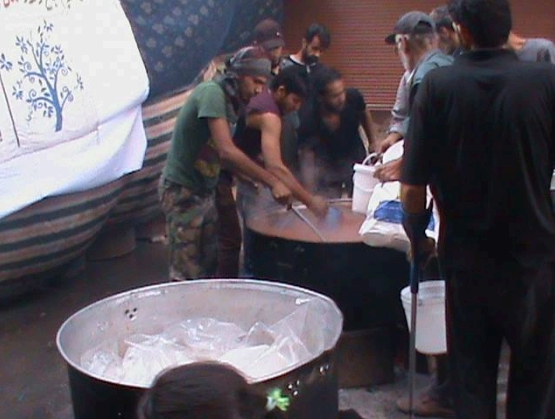“Our lives are ruined. We have lost our privacy and our ability to choose what to eat, when to eat and how much to eat," laments Abu Ali as he explains why he is standing in a queue in front of a charity kitchen in the Tadamon neighborhood.
"Kitchens have lost their value. They have become nothing more than walls and empty shelves. There isn’t any food or supplies left. We barely get what we need from charity kitchens."
Abu Ali is a former government employee who lives with his four sons, one of whom is crippled and the other blinded by a shell that damaged his eye. His wife was killed several months ago by a mortar that fell near their house. The head of the family says they "lived on charity”, and can no longer make a living after he lost his job when all official departments in southern Damascus closed over a year ago.
Abu Ali adds that he and his children eat only when the kitchen provided them with a meal. If they don't receive a meal, he says, the family sleeps on empty stomachs.
A continuous siege and bombardment of the area has destroyed all life's necessities and imposed a tragic reality on the southern parts of Damascus.
The situation is most clearly apparent in Hajar al-Aswad, Tadamon, Sleikha and other areas which haven’t yet complied to a truce or reconciliation agreement with the Assad regime and are still controlled by armed militias.
“The people of the south of Damascus have reached a severe level of hunger, exhaustion and poverty," says Hajj Fouad, the head of the Charitable Association of Orphans and the civil affairs official in Tadamon and Sleikha neighborhoods.
"They are hungry and children are dying because of severe malnutrition, we have run out of all food supplies. We had to eat unknown plants, some of them – called bird leg – turned out to be poisonous and caused new kinds of illnesses among those who ate them. We also had to eat cactus leaves we even ended up eating dogs, cats, even donkeys before we came up with a solution."
Fouad points out that organizing charity and rescue work to provide the minimum level of nutrition to help people get through this situation was vitally needed, prompting the launch of the charity kitchens. The kitchens depend on donations that charity organizations collect to cook enough food and serve them as ready-to-eat meals to thousands of poor families.
Charity kitchens became a necessity after the number of widows, orphans, elderly and sick people, as well as the poor and displaced people who came from Sbeineh, Hujjeora, Hajar al-Aswad and other neighborhoods increased. Fouad says over 1,000 families in the area now depend on charity kitchens for a single meal.
The besieged Hajar al-Aswad neighborhood is inhabitatd by between 2,000 and 2,500 families suffering from the siege. Getting in and out is almost impossible. In addition to the siege held by the regime army, there is an internal war between the armed militias which control the neighborhood.
Since battles broke between the Islamic State (IS) on one hand and the Islamic Front one the other, the area has become a battlefield, one resident says.
Rami Alsaied, an activist, said that the humanitarian situation in the city is becoming worse as Assad’s regime has prevented all humanitarian aid from coming in, adding that the besieged people have to wait for hours to get a pot of hot soup from relief organizations.
Some videos filmed by a media activist in one southern Damascus neighborhood shows a woman holding a pot and waiting for her share in front of one of the charity kitchens. She says that she and her four children have nothing to eat, and they suffer from different diseases, because of the lack of food and because she hadn’t received any kind of aid for several months. This is why she carries her pot from one kitchen to another, standing in these queues to find something so that she and her children can eat, she says.
The meals provided by charity kitchens aren’t especially nutritious; they mainly consist of rice, stock, boiled lentils, or vegetables.
"We spend what we are given,” says Fouad. "Since donations are rare and infrequent, the need for donations that come from outside to prepare more food for people has grown bigger, while donations retracted. We need more attention on the situation and the humanitarian disaster in the south of Damascus."
He says the meals the charity kitchens provide to the poor families in Tadamon and Sleikha neighborhoods cost about $1,895 per day, a sum he can’t always provide.
Unemployment, disease, the siege, the lack of job opportunities and the absence of agriculture have all exacerbated the hunger and made it hard for people to find food. The ongoing siege, in addition to the nature of southern Damascus in terms of lack of farmable lands and electricity, fuel and water is a threat to life for the people of this area, unless aid is delivered immediately.
......


